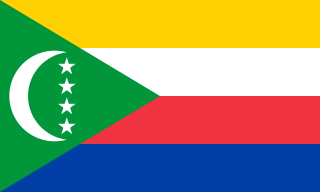
The Comoros, officially the Union of the Comoros, is an independent country made up of three islands in southeastern Africa, located at the northern end of the Mozambique Channel in the Indian Ocean. Its capital and largest city is Moroni. The religion of the majority of the population, and the official state religion, is Sunni Islam. As a member of the Arab League, it is the only country in the Arab world which is entirely in the Southern Hemisphere. Comoros proclaimed their independence on July 6, 1975. It is also a member state of the African Union, the Organisation internationale de la Francophonie, the Organisation of Islamic Cooperation, and the Indian Ocean Commission. The country has three official languages: Chi Comori, French and Arabic.
The history of the Comoros extends to about 800–1000 AD when the archipelago was first inhabited. The Comoros have been inhabited by various groups throughout this time. France colonised the islands in the 19th century, and they became independent in 1975.

The Union of the Comoros consists of the three islands Njazidja, Mwali (Moheli) and Nzwani (Anjouan) while the island of Mayotte remains under French administration. The Politics of the Union of the Comoros take place in a framework of a federal presidential republic, whereby the President of the Comoros is both head of state and head of government, and of a multi-party system. Executive power is exercised by the government. Federal legislative power is vested in both the government and parliament. The precolonial legacies of the sultanates linger while the political situation in Comoros has been extremely fluid since the country's independence in 1975, subject to the volatility of coups and political insurrection.

The national flag of the Union of the Comoros was designed in 2001 and officially adopted on 23 December 2001. It continues to display the crescent and four stars, which is a motif that has been in use in slightly various forms since 1975 during the independence movement. In its constitution, the government of the Comoros refers to the insignia as l'emblème national, or the "national emblem", though it is understood to actually represent a flag.
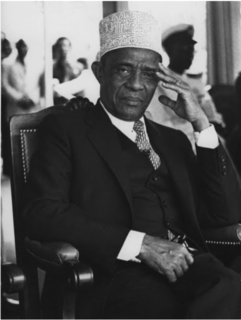
Ahmed Abdallah Abderemane was a Comorian politician. He was a member of the French Senate from 1959 to 1973, and President of the Comoros from 25 October 1978 until his assassination in 1989.
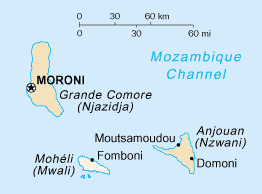
Mohéli[mɔ.e.li], also known as Mwali, is an autonomous island that forms part of the Union of the Comoros. It is the smallest of the three major islands in the country. It is located in the Indian Ocean off the coast of Africa and it is the smallest of the four major Comoro Islands. Its capital and largest city is Fomboni.
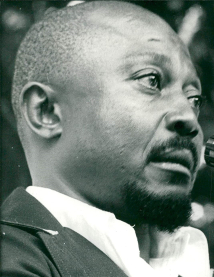
Ali Soilih M'Tsashiwa was a Comorian socialist revolutionary and political figure who served as the 3rd President of the Comoros from 3 January 1976 to 13 May 1978.

Elections in the Comoros take place within the framework of a multi-party democracy and a presidential system. The President and the majority of the seats in the Assembly of the Union are directly elected.

Said Mohammed Djohar was a Comorian politician who served as the 4th President of the Comoros from 1989 to 1995.
Said Atthoumani was a Comorian politician.
Abdallah Mohamed was a Comorian politician. He served as prime minister of Comoros from January 7, 1976, until December 22, 1978. He was a nephew of Mohamed Ahmed. For most of that time he was serving under President Ali Soilih. After Soilih was overthrown and killed in a Coup d'état, Mohamed remained in his post for a few months under the new regime of Ahmed Abdallah. He was eventually dismissed, however. He died in Mutsamudu, on the island of Anjouan in 2000.

Prince Said Mohamed Jaffar, full name Said Mohamed Jaffar El Amjad, was the 2nd President of Comoros (État comorien) from August 1975 until January 1976, as well as chief minister of the Comoros government from July until December 1972.
The Comorian Union for Progress is a political party in the Comoros.
The Comoros is an island nation in the Indian Ocean, located off the eastern coast of Africa. France first established colonial rule in the Comoros in 1841. Agreement was reached with France in 1973 for the Comoros to become independent in 1978. On July 6, 1975, but the Comorian parliament passed a unilateral resolution declaring independence. The deputies of Mayotte, which remained under French control, abstained. Referendums on all four of the islands excluding Mayotte showed strong support for independence. Ahmed Abdallah proclaimed the Comoros' independence on September 5, 1975 and became its first president.
This page list topics related to Comoros.

A constitutional referendum was held in the Comoros on 1 October 1978 following the overthrow of Ali Soilih on 13 May. The new constitution created a presidential and federal republic, granting each island its own legislature and control over taxes levied on individuals and businesses resident on the island, whilst reserving strong executive powers for the president. It also restored Islam as the state religion, while acknowledging the rights of those who did not observe the Muslim faith.

The Rally for Change and Democracy was a political party in the Comoros led by Said Hassane Said Hachim.

Comoros–North Korea relations refers to the current and historical relationship between the Comoros and the Democratic People's Republic of Korea (DPRK), commonly known as North Korea. Neither nation maintains an embassy in their respective capitals. Formerly the DPRK had an ambassador stationed in Moroni.
Cannabis in Comoros is currently illegal as of September 2019. Between January 1975 and May 1978, cannabis in Comoros was legal, legalized by president Ali Soilih.
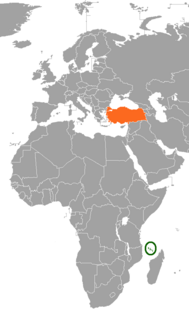
Comoros–Turkey relations are the foreign relations between the Comoros and Turkey. Diplomatic relations at the rank of ambassador were established in 1979.









